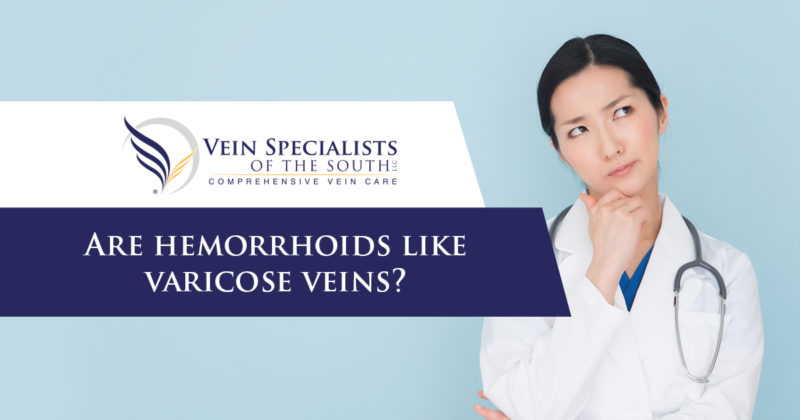While hemorrhoids may be an uncomfortable topic for discussion with your medical practitioner, they are even more uncomfortable to live with every day. Despite the infrequency with which you hear them mentioned, hemorrhoids are surprisingly common, especially during pregnancy and middle age. But, what exactly are hemorrhoids and how do they form? Are hemorrhoids like varicose veins? What type of doctor should you see for evaluation and treatment? Learn all about this uncomfortable topic below.
Hemorrhoids Like Varicose Veins?
While hemorrhoids and varicose veins refer to conditions on two separate areas of the body, they are surprisingly similar. Both occur due to bulging veins related to poor venous valves. Many of your veins have one-way valves that prevent blood from pooling and help send blood back up to your heart. When these valves do not work properly, blood stays in the veins, causing them to enlarge and bulge.
Hemorrhoids Overview
Hemorrhoidal tissue is present in everyone. This tissue includes many arteries and veins as well as connective tissues and surrounding muscles. While hemorrhoidal tissue is normal, enlarged internal or external hemorrhoids are considered abnormal. They appear when the veins in the hemorrhoidal tissue become swollen. Internal hemorrhoids occur within the body. They do not usually cause pain but may cause light bleeding that you notice when using the restroom. External hemorrhoids are the ones that cause the most issues. Externally, there are plenty of nerves to cause pain, itching and tenderness, especially when using the restroom.
Varicose Veins Overview
On the other hand, varicose veins occur when the veins lying directly beneath the skin become enlarged and bulky due to backed-up blood. While varicose veins can technically occur in any veins, they are most often seen in the feet and legs. You may recognize them by their ropy, twisting appearance.
Asymptomatic varicose veins may only make you say “no” to wearing shorts and swimming suits. However, symptomatic varicose veins and hemorrhoids may give you pain, itching, aching and scaly skin. A common symptom of internal hemorrhoids is painless bleeding especially after going to the bathroom. Bleeding from enlarged leg varicose veins and spider veins often seen after showering is one of the top reasons patients seek the care of a vein specialists.
Who Is At Risk For Hemorrhoids?
If you are at risk for varicose veins, you are also at risk for hemorrhoids, and vice versa. Both problems occur frequently in pregnancy due to increased blood in the venous system as well as the pressure of the baby on the pelvis. Other risk factors for both hemorrhoids and varicose veins include genetics, obesity and increased age. Additionally, extra pressure and weight on the affected areas increase your chance of developing enlarged veins. For varicose veins, this could include long periods standing or frequent crossing of the legs. For hemorrhoids, risk factors increase when you spend long periods sitting on the toilet or straining with constipation.
Should I See A Vein Specialist About My Hemorrhoids?
While seeing a vein specialist is your best solution for helping you get rid of varicose veins, you will need to see a different medical specialist if you believe you have hemorrhoids. Many general practice doctors can help you as can proctologists, doctors who specialize in diseases of the colon and rectum. A proctologist will be able to help you make lifestyle changes that can relieve your hemorrhoid symptoms. They can also offer in-office or outpatient surgical treatments to reduce or remove your hemorrhoids. Ligation, banding, sclerotherapy and hemorrhoidectomy are the most frequently used options for hemorrhoids that do not clear up on their own.
Research continues in the evaluation of underlying anatomical causes of hemorrhoids. Advances in diagnostics with more detailed ultrasound evaluations and CT scans of the pelvic and iliac venous blood flow has surprisingly identified new sources of hemorrhoids. Therefore the evaluation and treatment of the underlying source of hemorrhoid development may now involve seeing a vein specialists.
Do You Have Varicose Veins In The Legs? Contact The Vein Specialists
If you have varicose veins in the legs or have troubling symptoms in your legs such as pain, heaviness, itching, or swelling, you can find compassionate care at Vein Specialists of the South. Dr. Kenneth Harper provides cutting-edge treatments for many common venous conditions, including spider veins, venous ulcers and varicose veins. In fact we may be of assistance in helping your proctologist with your hemorrhoids.
We lead the region in comprehensive vein care and understand the best technology for both the evaluation and treatment of the underlying causes of both leg varicose veins and hemorrhoids. Contact us at Vein Specialists of the South in Middle Georgia for a consultation or for more information.










